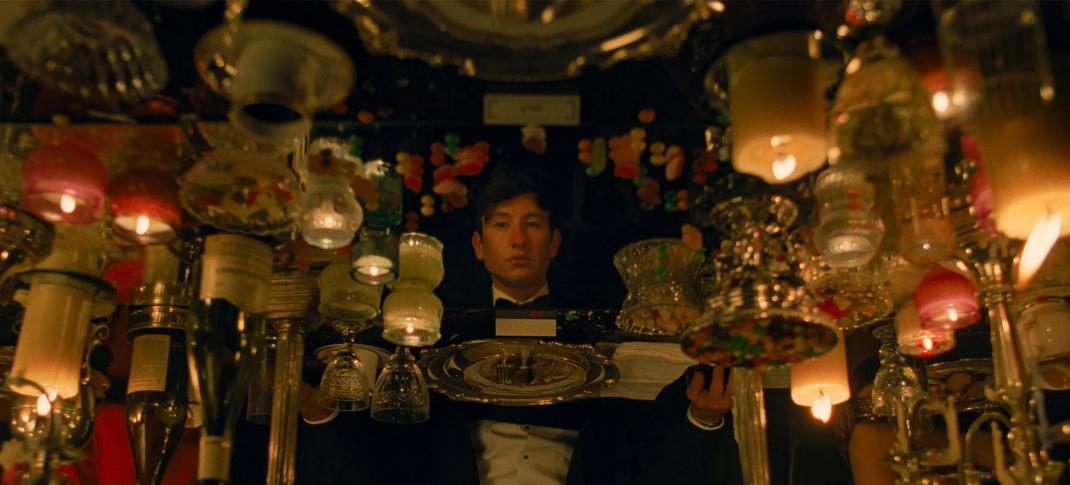'Saltburn' Packs A Punch, Even If The Blow Isn't Nearly Hard Enough

Barry Keoghan as Oliver in 'Saltburn'
MGM
When Emerald Fennell accepted her BAFTA for writing Promising Young Woman in 2021 (virtually, as the country was in lockdown at the time), she was sitting in a glamorous hotel room, complete with a grand piano just over her shoulder. The sudden display of glamour (Fennell clarified she was in a hotel room and not her own home) felt pointed on a night where the top awards went to films and performances about society’s most impoverished and marginalized, but class has clearly been on Fennell’s mind thereafter; her next project, Saltburn, a pop-fuelled riff on Brideshead Revisited, was announced early the following year. Maybe the whole project was just so something else would come up when you googled “Emerald Fennell Rich.”
After a difficult, alienating first term at his elitist Oxford college, Oliver Quick (Barry Keoghan) falls in with the tremendously cool and disgustingly rich crowd of Felix Catton (Jacob Elordi). The Merseyside-raised outsider becomes infatuated with everything Felix – his good looks, his affable charm, his social (and literal) currency, blurring the line between homosocial and fully romantic attraction. Felix soon invites Oliver to stay at his ma-hoosive country estate for summer, where he gets to see how the other half (well, more like the other 0.2%) lives.
As Oliver plainly asserts a difficult childhood being raised by addicts, there are shades of The Talented Mr Ripley’s desires for class ascension and performing a pitiable past. But with its dark academia setting, this is also Donna Tartt’s The Secret History through and through, with jaded, megarich youth and inflexible family burdens – challenged by an ambiguous outsider infiltrating their ranks. But in trying to mesh its interconnected influences, Saltburn realizes too late that it needs to come up with its own messages, resulting in a film that delights with dark, blunt frivolity but fails to cogently deconstruct its aristocratic setting.
For years, we’ve been inundated with films that satirize the uber-rich less as meaningful political commentary and more as an aesthetic. Ready or Not, The Menu, Triangle of Sadness, and even beloved properties like The White Lotus and the Knives Out franchise feel somewhat hollow in their creative analysis of class dynamics; they’re happy to do a few attention-grabbing twists and extensively mock the superficial behavior of their privileged toffs. Saltburn stands out because it’s about British aristocracy, a world formerly explored by world-class writers like Austen, Eliot, and Thackeray – now cinema’s glitzy satiric eye is turned on one of the oldest and most insane upper-crust worlds.
But it’s quite easy to laugh at rich people, especially British ones – they’re ridiculous sociopaths!! – and much harder to articulate the true insidiousness of their existence. Often in Saltburn, Felix’s family – his sister Venetia (Alison Oliver), mother Elspeth (Rosamund Pike), and father Sir James (Richard E. Grant) – will say frightfully posh things or casually bring up their silly rules and suffocating politeness. This is largely very good fun, but it would be much more enjoyable making fun of these people were it not for their massive power over land, property, government positions, and contracts and their ability to buy exemptions from the laws of the land.
Hypocrisy is the lifeblood of anti-rich satire, and as Oliver sets out to prove, it’s very easy to hoodwink those with colossal means. Yet we never truly see any examples of barbaric behavior from the Cattons when their sheer existence, surely, is a violent act. Fennell shows little interest in unpacking the systems that allow the Cattons to exist; she’s happier to point out all their many social quirks. It’s fun but facile.
But the fun shouldn’t be overstated. Saltburn may not be structured tightly or maintain a perfect tone, but it’s a better film because of its entertaining excesses. With his twitchy affability, Keoghan initially strains to pull off Oliver’s manipulations but sings as a prying, impulsive little weirdo intoxicated by Felix’s world. Elordi has graduated from being a Netflix pretty boy into an actor who dominates rooms with his physique and is always aware, at least a little, of the sway he holds over those drawn to his charm.
Fennell also proves she can handle what’s best described as “unhinged eroticism.” The debauchery in Saltburn, largely characterized as a bristling intimacy that reveals the rich characters’ deepest vulnerabilities, can feel a bit calculated in design, but it’s tough to argue with the shuddering breaths, and firm grasps that fill the film’s private moments. (Oliver uses his mouth in some, erm, startling ways throughout.)
It’s an exemplary microcosm of Saltburn’s main issues: as horny delirium, it’s beyond reproach; as metaphor for social criticism, it conjures several passionately-felt question marks. It’s dazzling, not-really-original fluff. Saltburn proves such stories can still pack a punch, but an attack on aristocracies are supposed to be a lot tougher to swallow than this.
Saltburn debuted at the BFI London Film Festival on October 4, 2023. It will open in limited release in the U.S. on Friday, November 17, before moving into wide release on Wednesday, November 22, 2023. It is expected to debut on streaming before the end of the year.






